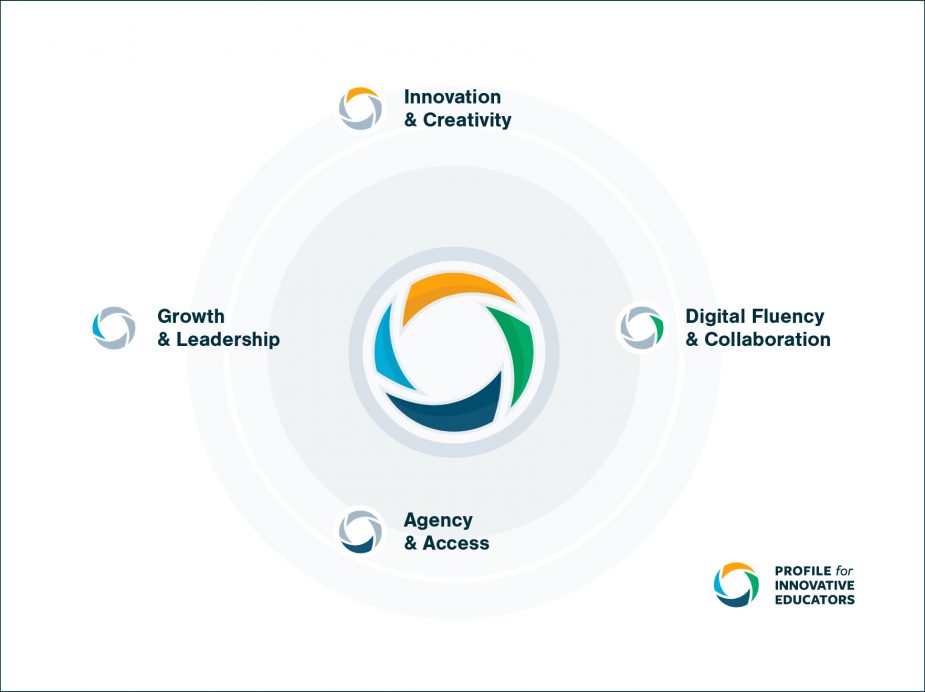Our team at Advanced Learning Partnerships works with some talented and dedicated educators and we have been a part of some innovative and creative work in schools over the years. While our education partners love our work and are highly satisfied with the changes they see in their district, we felt a need to better document the impact of our consulting services and district educators’ professional growth and learning. We created the Profile for Innovative Educators©, or PIE, for a few reasons.
We partner with many educators who are already going above and beyond in their classrooms but nonetheless maintain a passion for learning and growing their skills. Indeed, our work with educators over the years has revealed that this growth mindset is essential for innovation in education. After a long search, we could not find a coaching tool that adequately captured and supported this type of growth and told the story of our educator partners’ hard work and change.
We also wanted to know what makes an educator innovative and how we as consultants and coaches can support others who are interested in building these skills. We conducted a multi-phase validation study1 and analyzed educational research, major movements, and innovative standards and practice in education. More importantly we talked to, studied, and worked closely with teachers, coaches, and education leaders to determine the key competencies teachers needed to be innovative in the classroom. PIE provides a comprehensive competency profile that documents each teacher’s unique professional learning goals surrounding the four competency domains depicted and described in more detail below.
Each bulleted competency includes descriptors of teacher behaviors and classroom system and culture ranging from “Prescribe” to “Instruct” to “Model” to “Facilitate.” Descriptors are streamlined and concise to allow for observations, coach-teacher dialogues, and a common language on which to set specific and targeted professional learning goals.
Innovation & Creativity
The Innovation & Creativity domain includes three competencies: New Perspectives, Collaborative Creative Processes, and Student-driven Work and Projects. These competencies detail a specific progression of teacher behaviors and classroom systems around perspective taking, reflection, respectful dialogue and debate; creativity and risk taking; generation of innovative solutions; and student-developed learning opportunities.
Digital Fluency & Collaboration
This domain includes the competencies of Digital Tools, Research & Media Literacy, and Digitally based Communication and Collaboration. These competencies describe teacher behaviors and classroom systems around student-led identification, evaluation, and application of appropriate technological tools in projects/activities; research skills (collection, analysis, synthesis, and evaluation of diverse information streams and sources) and ethical uses of information; and safe and productive collaboration skills via use of social networks, school learning management systems, and research projects that require interactive, virtual and face-to-face collaboration within and outside the classroom (e.g., student groups, community groups, international students).
Agency & Access
Learner Agency & Access domain include the competencies: Learner Goals and Agency and Access to Learning Data. This domain includes descriptive progressions surrounding the integration of formative assessment and learning; student-driven learning goals based on learning interests, abilities and needs; expectations for learner agency and mastery prior to advancement; and student access to ongoing learning feedback and assessment data.
Growth & Leadership
Professional Growth & Leadership domain includes Technology & Innovation Leadership and Learning Communities competencies. These competencies provide a common language for teachers working on development as leaders and mentors for school and district-based innovation and technology integration efforts and working to lead and build ties throughout the school and district community for the enhancement of student learning.
1 The Profile for Innovative Educators’ competency framework and proficiency scales were developed and validated based on a multi-phase study including: review of educational research; subject matter expert interviews; critical incidents study; and pilot studies across two districts with subsequent revisions and refinement.


